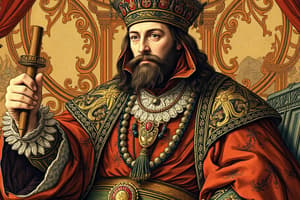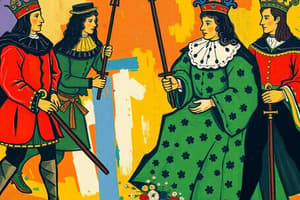Podcast
Questions and Answers
Who was the last Tudor monarch that died without an heir?
Who was the last Tudor monarch that died without an heir?
- Henry VIII
- Elizabeth I (correct)
- Charles I
- James I
What significant event is associated with Guy Fawkes?
What significant event is associated with Guy Fawkes?
- The Gunpowder Plot (correct)
- The execution of Charles I
- The signing of the Magna Carta
- The English Bill of Rights
Which of the following statements best describes Parliament?
Which of the following statements best describes Parliament?
- It represents only the religious groups of England.
- It is a gathering that reaffirms the monarchy.
- It is comprised solely of noble families.
- It involves elected members who approve or reject laws. (correct)
What best describes the term 'Treason'?
What best describes the term 'Treason'?
Who was John Hampden in relation to the early Stuart period?
Who was John Hampden in relation to the early Stuart period?
Which statement best defines 'Absolute' in the context of monarchy?
Which statement best defines 'Absolute' in the context of monarchy?
What role did the House of Lords play in the British legislative process?
What role did the House of Lords play in the British legislative process?
Who were the Puritans?
Who were the Puritans?
Which event marked the beginning of James I's reign?
Which event marked the beginning of James I's reign?
What was the Gunpowder Plot?
What was the Gunpowder Plot?
What was one effect of religious toleration in the Stuart period?
What was one effect of religious toleration in the Stuart period?
What does 'Divine Right' imply about monarchy?
What does 'Divine Right' imply about monarchy?
Which of the following best describes the House of Commons?
Which of the following best describes the House of Commons?
What was the impact of the Eleven Years' Tyranny?
What was the impact of the Eleven Years' Tyranny?
What was the purpose of Ship Money?
What was the purpose of Ship Money?
What does the Speaker's Chair represent in Parliament?
What does the Speaker's Chair represent in Parliament?
Flashcards are hidden until you start studying
Study Notes
Key People
- Elizabeth I: Last of the Tudor monarchs, died in 1603 without an heir.
- James I: First Stuart king of England, crowned in 1603.
- Guy Fawkes: Tried to kill James I in the Gunpowder Plot of 1605.
- Henrietta Maria: Wife of Charles I and Catholic.
- Charles I: Second Stuart king of England, reigned from 1625 to 1649.
- John Hampden: MP who refused to pay Ship Money and was imprisoned in 1637.
- John Pym: MP who opposed Charles I. Published a book in 1632 critiquing the King's absolute rule.
Stuarts
- The Stuart dynasty ruled England between 1603 and 1714.
- They experienced a period of challenging rule, including The Eleven Years of Tyranny (1629-1640), where Charles I ruled without Parliament.
The Gunpowder Plot
- A plot to assassinate James I and blow up Parliament in 1605.
- Guy Fawkes was one of the main conspirators.
- This event is still remembered with a public holiday on November 5th.
Charles I and Parliament
- Charles I believed in the Divine Right of Kings - that God appointed him as a ruler.
- He clashed with Parliament over issues like taxation and religion.
- He attempted to arrest five MPs in 1642, which started the English Civil War (1642-1651).
Other Key Facts
- Ship Money: A tax levied on coastal towns for naval defense, but seen as a way for Charles to raise money without Parliament.
- **Eleven Years of Tyranny (1629-1640): ** Charles I ruled without Parliament, dissolved it in 1629, and used the royal prerogative to raise money by other means.
- The Long Parliament (1640-1660): A period where Parliament was in session throughout the English Civil War and into the Restoration.
- The Bishops' Wars (1639-1640): A series of conflicts in Scotland between Charles I and Scottish Presbyterians.
- Wife Sale: In some villages during this time, men would publicly sell their wives as a form of divorce.
Studying That Suits You
Use AI to generate personalized quizzes and flashcards to suit your learning preferences.




